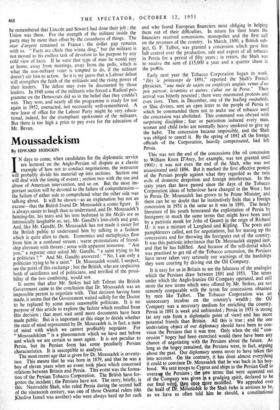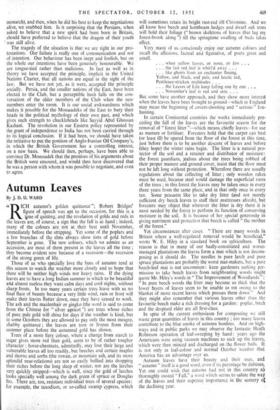Moussadekism
By EDWARD HODGKIN
IN days to come, when candidates for the diplomatic service are lectured on the Ang,lo-Persian oil dispute as a classic example of how not to conduct negotiations, the instructor will probably divide his material up into. sections. Section one will deal with the timing of events ; section two with the use and abuse of American intervention, and so on. But the most im- portant section will be devoted to the failure of comprehension— the failure of either side to comprehend what the other side. was talking about. It will be shown—as an explanation but not an excuse—that the British found Dr. Moussadek a comic figure. It is always easier to laugh than to understand, and Dr. Moussadek/ fainting-fits, his tears and his iron bedstead in the Mejlis are as intrinsically laughable as, say, Mr. Gandhi's loin-cloth and goat. And, like Mr. Gandhi, Dr. Moussadek has not made it easier for the British public to understand him by talking in a fashion which is quite alien to them. Economics and metaphysics flow from him in a confused stream ; warm protestations of friend- ship alternate with threats ; sense with apparent nonsense. " Are you," a reporter once asked Mr. Gandhi, " a saint trying to be a politician ? " And Mr. Gandhi answered : " No, I am only a politician trying to be a saint." Dr. Moussadek would, I suspect, see the point of this exchange ; but the British, who are suspicious both of saintliness and of politicians, and terrified of the possi- bility of the two combining, would not. It seems that after Mr. Stokes had left Tehran the British Government came to the conclusion that Dr. Moussadek was an impossible person to negotiate with. That decision having been made, it seems that the Government waited sulkily for the Doctor to be replaced by some more reasonable politician. It is no purpose of this article to explore the failure which resulted from this decision ; that must wait until more documents have been made public. But it is important at this stage to decide whether the state of mind represented by Dr. Moussadek is, in fact, a state *of mind with which we cannot profitably negotiate. For " Moussadekism " is a phenomenon which we have met before and which we are certain to meet again. - It is not peculiar to Persia, but its Persian form has some peculiarly Persian characteristics. It is susceptible to analysis.
The most recent age that is given for Dr. Moussadek is seventy- two. This means that he was born in 1879, and that he was a boy of eleven years when an event took place which concerned rerations between Britain and Persia. This event was the forma- tion of the Persian Tobacco Corporation. The British have for- gotten the incident ; the Persians have not. The story, briefly, is this. Nasiruddin Shah, who ruled Persia during the second half of the nineteenth century, was one of those Oriental rulers (the Khedive Ismail was another) who were always hard up for cash and who found European financiers most obliging in helping them out of their difficulties, In return for their loans the financiers received concessions, monopolies and the first call on the revenues of the country. In March, 1890, a British sub- ject, G. F. Talbot, was granted a concession which gave him full control over the production, sale and export of all tobacco in Persia for a period of fifty years ; in return, the Shah was to receive the sum of £15,000 a year and a quarter share in the profits.
Early next year the Tobacco Corporation began to work. "Des le printemps de 1891," reported the Shah's French physician, "une nuee de sujets ou employes anglais venus d'un peu partout, levantins et autres, s'abat sur la Perse." Their arrival was bitterly resented ; there were murmured protests and even riots. Then, in December, one of the leading mujtahids, or Shia divines, sent an open letter to the people of Persia in which he commanded them not to make use of tobacco until the concession was abolished. This command was obeyed with surprising discipline ; fear or patriotism induced every man, woman and child (who are norm#1ly heavy smokers) to give up the habit. The concession became impossible, and the Shah was obliged to cancel it. By the spring Of 1892 all the foreign officials of the Corporation, heavily compensated, had left Persia.
This was not the end of the concessions (the oil concession to William Knox D'Arcy, for example, was not granted until 1901) ; it was not even the end of the Shah, who was not assassinated until 1896. But it marked the first effective protest of the Persian people against what they regarded as the twin evils of domestic despotism and foreign interference. In the sixty years that have passed since the days of the Tobacco Corporation ideas of behaviour have changed in the West ; but in Persia Dr. Moussadek has grown to be Prime Minister., and there can be no doubt that he instinctively feels that a foreign concession in 1951 is the same as it was in 1891. The heady literature of his youth bemoaned the exploitation of Persia by foreigners in much the same terms that might have been used by a patriotic monk (or John of Gaunt) in the reign of Richard II: it was a mixture of Langland and Kipling. The poets and pamphleteers called, not for negotiations, but for tearing up the concessions and for throwing the foreigners out oof the country. It was this patriotic inheritance that Dr. Moussadek stepped into, and that he has fulfilled. And because of the-self-denial which was practised to get rid of the Tobacco concession, the Persians have never taken very seriously our warnings of the hardships they were courting by driving out the Oil Company.
It is easy for us in Britain to see the falseness of the analogies which the Persians draw between 1891 and 1951. The terms under which the Anglo-Iranian Oil Company operated, and still more the new terms which were offered by Mr. Stokes, are not remotely comparable with the terms for concessions obtained by men like Talbot. The Tobacco Corporation was an unnecessary incubus on the country's wealth ; the Oil Company was a necessary medium for enriching the country. Persia in 1891 is weak and unfriended ; Persia in 1951 is strong (at any rate from a diplomatic point of view) and has more potential friends than Britain. All this is true ; and the one undeviating object of our diplomacy should have been to con- vince the Persians that it was true. Only when the old " con- cession " bogey. had been exorcised would there have been any chance of negotiating with the Persians about the future. As long as the bogey remained, the Persians Were, in fact, arguing about the past. Our diplomacy seems never to have taken this into account. On the contrary, it has done almost everything it could to convince Dr. Moussadek that he was back in his boy- hood. We sent troops to Cyprus and ships to the Persian Gulf to overavg the Persians ; the lileW terms that were squeezed out of the Company was given In a grudging spirit, declared to be our final 14,109. aiso. 'ore modified. We appealed over the hedd of . Moussadek to the Shah (who is anxious to be, as we have so often told him he should, a constitutional monarch), and then, when he did his best to keep the negotiations alive, we snubbed him. Isit surprising that the Persians, when asked to believe that a new spirit had been born in Britain, should have preferred to believe that the dragon of their youth was still alive.
The tragedy of the situation is that we are right in our pro- testations. Our failure is really one of communication and not of intention. Our behaviour has been inept and foolish, but on the whole our intentions have been genuinely honourable. We are tongue-tied rather than malicious. In fact as well as in theory we have accepted the principle, implicit in the United Nations Charter, that all nations are equal in the sight of the law. But we have not yet, as it were, accepted the principle socially. Persia, and the smaller nations of the East, have been elected to the Club, but a perceptible hush falls on the con- versation of the older members of the Club when the new members enter the room. It is our social awkwardness which makes it possible for the Moussadeks of the East to bury their heads in the political mythology of their own past, and which gives such strength to chuckleheads like Sayyid /OW Ghossan Kashani. The revolution in our Eastern policy represented by the grant of independence to India has not been carried through to its logical conclusion. If it had been, we should have taken the initiative to put the position of Anglo-Iranian Oil Company's, in which the British Government has a controlling interest, on a new basis. We should then, perhaps, have been able to convince Dr. Moussadek that the premises of his arguments about the British were unsound, and would then have discovered that he was a person with whom it was possible to negotiate, and even to agree.



































 Previous page
Previous page